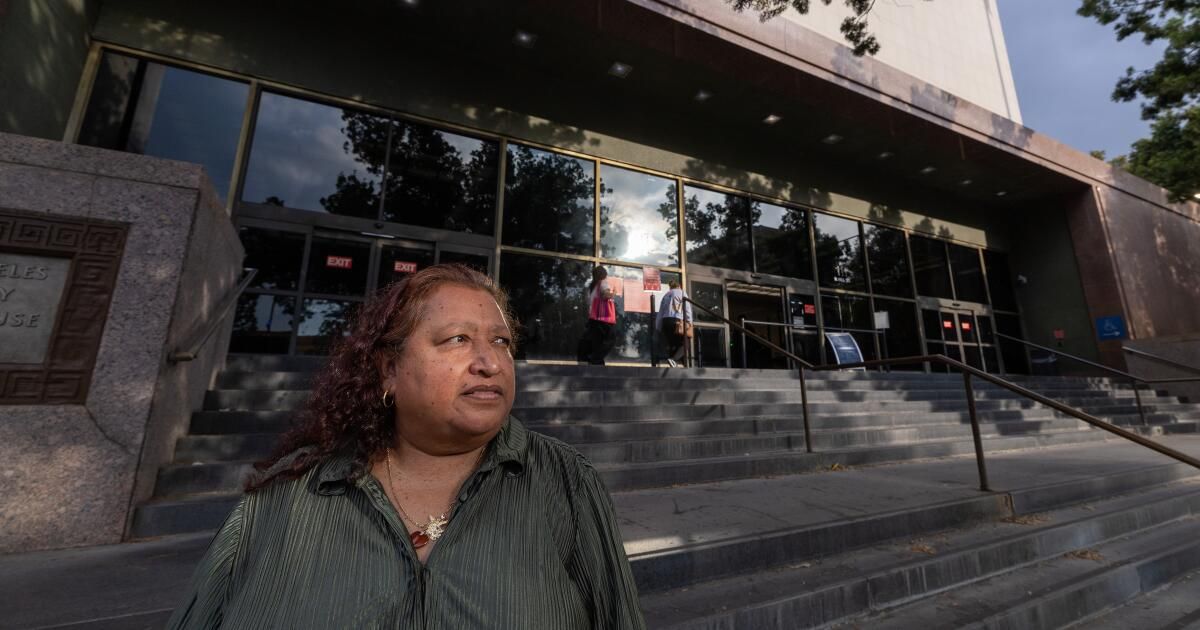In a bustling hallway on the sixth floor of a downtown courthouse, Alcira Ayala sat on a bench with her husband and daughter, anxiously waiting for her eviction case to be called to trial. She held a black cloth bag filled with neatly organized documents that she hoped would help her win her case and stay in the apartment she and her family have lived in for nearly two decades.
Since learning this summer that her landlord wanted to evict them, Ayala had spent days calling and showing up at the offices of local nonprofit groups asking for help.
She hoped to get a free lawyer, but soon realized there aren’t enough in the city to represent everyone who needs help. To try to defend herself, she went to the Los Angeles Law Library to ask for guidance on how to file the legally required response to the notice. Then, she attended hours of online training hosted by the nonprofit Eviction Defense Network, which teaches tenants without lawyers how to prepare for court.
Still, he was worried about misunderstanding something or saying the wrong thing, and he tried to prepare for the hearing.
“I cannot be intimidated,” she said. “I am fighting for my family.”
Every year, thousands of tenants across the city show up in court and face eviction proceedings without the help of an attorney. For years, advocates have urged the city to change that, arguing that guaranteeing attorneys for low-income tenants would correct a power imbalance that occurs in eviction court, where landlords almost always have attorneys while tenants do not. Now, the city is moving toward that change.
This month, the City Council voted 11-0 to direct the city attorney to draft an ordinance that would establish a city-funded program to provide attorneys to low-income tenants. The program would be phased in over five years, starting with high-need ZIP codes.
It would be funded through Measure ULA, also known as the “mansion tax,” which requires that 10% of the funds go toward providing legal services to low-income tenants threatened with eviction. The tax has raised $375 million in revenue since it went into effect last year.
Alcira Ayala, left, speaks with her daughter Anael Lopez, right, and her husband Juan Lopez before her court appearance at the Stanley Mosk Courthouse on Monday.
(Brian van der Brug/Los Angeles Times)
Earlier this year, the Los Angeles County Board of Supervisors voted in favor of a right-to-counsel program for low-income tenants in unincorporated areas of the county. That program is set to launch in January.
Some have criticized such efforts, saying they allocate money to lawyers when residents might be better off receiving direct assistance to avoid falling behind on rent and facing eviction in the first place.
“It’s a waste of money to spend the limited ULA funds the city receives on private attorneys,” said Daniel Yukelson, executive director of the Apartment Association of Greater Los Angeles. “The city should be helping tenants pay their rent so they can stay in their homes.”
But advocates say the experience of other cities shows that providing lawyers to tenants helps them stay in their homes and preserve affordable housing.
In New York City, which in 2017 became the first city in the country to guarantee attorneys for low-income tenants facing eviction, the Department of Social Services reported that by 2023, 84% of households represented by attorneys in court were able to remain in their homes.
In 2018, Los Angeles began exploring its own right-to-counsel program and eventually approved funding to start a limited eviction defense program. In 2021, with the pandemic raging and residents behind on rent, the city partnered with the county and local community and legal service providers to create Stay Housed LA, which offers support to tenants facing eviction, including connecting them with pro bono attorneys in a limited number of cases.
But requests for assistance have far outstripped the help available. Last year, for example, 7,446 city tenants requested legal representation. The program was able to provide attorneys to represent 997 tenants in court.
One of the biggest challenges has been the lack of attorneys available to take on eviction cases. Those who provide free services to low-income clients often lack the necessary resources. So organizations began working to teach residents how to navigate the court system to try to defend themselves.
“We explain to them what their rights are and how to create their own evidence package and use the proper language to present themselves before a judge,” said Sergio Vargas, co-director of the Los Angeles chapter of the Alliance of Californians for Community Empowerment (ACCE). “We have been able to have success with that, but it is not sustainable.”
In June, Ayala’s landlord served her with a three-day notice accusing her of preventing workers from removing plants and doing other renovations, denying access to the garage and failing to provide the landlord with a copy of her keys.
Ayala says she believes he was looking for excuses to evict her.
In court, the judge called Ayala’s case shortly after 9 a.m. She and her husband sat together at the lawyers’ table, with a translator behind them, whispering Spanish translations into a microphone. Her landlord, an older man, sat across the table from her. Her lawyer was not in court that day, but was on the phone.
The hearing ended within minutes. With the help of the law library, Ayala had filed a request for a jury trial before the hearing, hoping that a trial would allow him to present evidence in his defense.
The judge granted her request and set a trial date for early October. She had managed to delay the case for three weeks and, as she left the courtroom, said she was happy with the outcome but knew it was not over.
She planned to keep calling and appearing at as many legal organizations as she could find, trying to get a lawyer to take on the case. Maybe, now that her trial was fast approaching, someone would agree to help her with a payment plan, she said.












